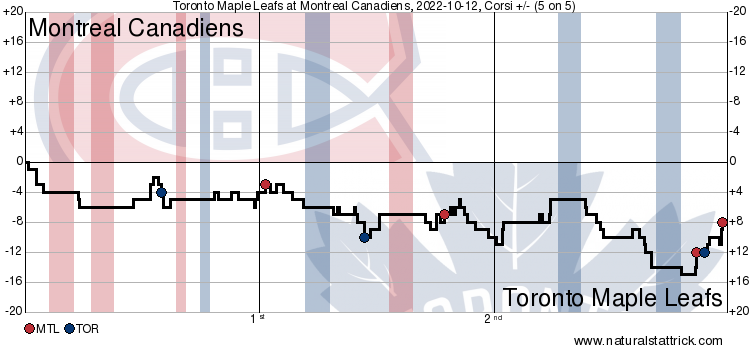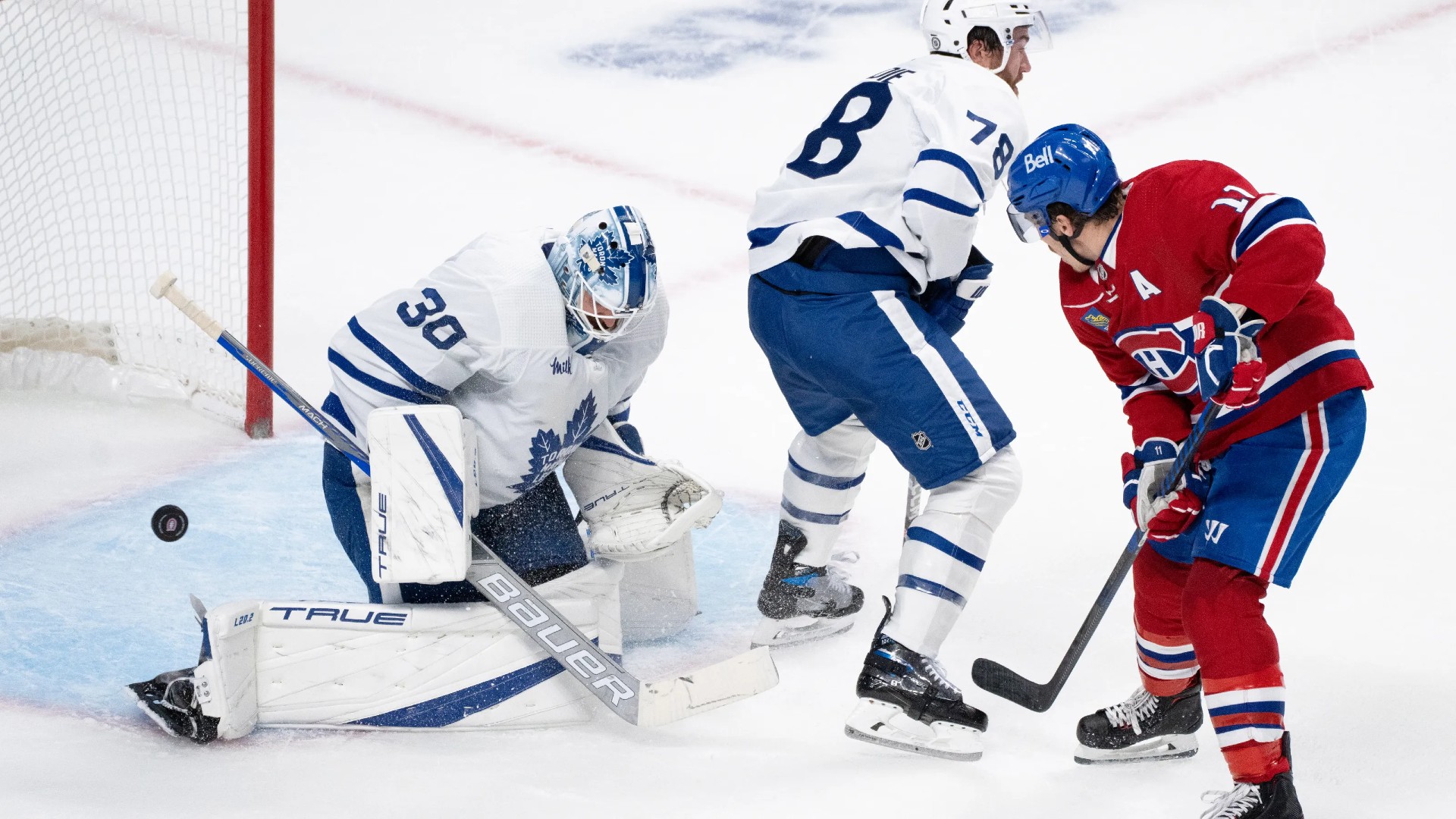There was a lot of talk before this game about the matchup between the Canadiens’ banged-up and inexperienced defense against the Maple Leafs’ firepower up front, but rarely is a season opener between the Leafs and Habs a non-competitive affair.
They’ve been to OT against each other in two of the last three openers, while the other Leafs win was a 2-1 game. This was opening night at the Bell Centre, after all, so a fired-up Habs team should’ve been the expectation, not a cakewalk.
Additionally, Martin St. Louis (15-19-4 as MTL head coach) nudged a number of the Habs’ underlying performance metrics toward the middle of the pack after taking over the bench last season, livening up their offense some and making them a more dangerous team in transition.
Unfortunately for the Leafs, they often fed into that Montreal transition game with sloppy puck management throughout the night, leading Sheldon Keefe to put his foot down already with a strong reprimand just 60 minutes into the new season:
Sheldon Keefe after an ugly loss to Montreal in the season opener: "As experienced a team as we are, that is unacceptable… We deserved to lose."
More from the head coach on a sloppy 4-3 defeat at the Bell Centre 👇 https://t.co/IiHp0zp8Ln #LeafsForever
— Maple Leafs Hotstove (@LeafsNews) October 13, 2022
Leafs hockey is back, baby!
Your game in 10:
1. By the numbers, the first period was an even 20 minutes (by unblocked shot attempts, scoring chances) in which the Leafs led 1-0, but they took three penalties, managed the puck poorly, and generally lacked pace and sustained offensive pressure in their game. They were caught in transition a number of times leading to either penalties or rushes against, and it was only thanks to the first-period play of Matt Murray and the playmaking of Mitch Marner — who set up the Michael Bunting 1-0 goal with a nice play below the goal line — that the Leafs held the lead through 20 minutes. After a pregame ceremony that dragged and dragged — as is Montreal tradition — the Habs came out inspired, and the Leafs were sloppy and slow to wake.
2. The Leafs’ sloppy play came home to roost early in the second period. On the first shift of the middle frame, Morgan Rielly was the first man in chasing down a cross-corner dump-in, Auston Matthews committed as the third forward down low, and an errant Mitch Marner pass sent Nick Suzuki and Cole Caufield away on an odd-man rush, which they took full advantage of to tie the game at 1-1. There was no chance for Matt Murray on that one as Caufield picked his spot up high from in tight.
3. The Leafs’ response after that goal against was one of their better sequences of the game in terms of finally finding a reasonable segment of rhythm where they were able to make multiple line changes while sustaining offensive-zone pressure, but that was too rare of an occurrence in this game with the poor decision-making and general sloppiness that plagued them while in possession. There was another solid stretch in the middle section of the third period where they really should’ve taken a 3-2 lead through the power plays and o-zone time they generated, but they did not control the game at 5v5 at the level expected of them over the 60 minutes.
4. Halfway through the second period, Denis Malgin gave the Leafs a 2-1 lead after a good rush play by him, William Nylander, and John Tavares led to a rebound that Malgin was in the right spot — parked at the top of the crease — to deposit into the empty net. Malgin might’ve stolen the headlines tonight if he had scored on the breakaway — sprung by a nice Morgan Rielly pass —prior to the 2-2 Montreal goal, but he fired just wide and off the outside of the post with a chance to make it 3-1, which was a big swing moment in the game (as well as Alex Kerfoot‘s missed penalty shot with the score at 2-2).
That said, for a player trying to re-establish himself in the league, etching your name on the scoresheet in game one never hurts. I am not personally sold on the composition of the second line with Malgin there, but we’ll watch and see.
5. The 2-2 goal late in the second period featured more sloppiness from the top line, earning Michael Bunting a short-lived benching from Sheldon Keefe, who no doubt talked ad nauseam — before the game and at the first intermission — about taking care of the puck in the critical areas of the ice against a fast team in transition.
Bunting threw a blind bank pass behind him high in the offensive zone that sparked another odd-man rush that Cole Caufield called his own number on by beating Matt Murray cleanly at his near-post. Maybe Morgan Rielly could’ve played the shooter a little tighter in a 2v2 situation there, but Murray fairly admitted after the game he should’ve been step further out and more aggressive on that one.
Despite scoring the opening goal, Bunting finished at just 12:58 in time on ice (including only 3:38 in the second period).
6. Another forced play that did not account for either time or place came via Justin Holl on the late game-losing goal. Both teams were running out the clock content to collect the point at that stage — TJ Brodie held onto the puck for like 15 seconds in his own zone un-pressured just moments before — and it was an easy play to make down the wall from Holl, who forced a puck into the middle of the offensive zone for a turnover. Jake Muzzin took over from there with a treacherous pizza in the slot during the chaotic aftermath of the odd-man rush against.
It was a nightmare start from a pairing that really could’ve used a quiet and steady first game back together after their struggles last season. Muzzin often looked clunky and clumsy in this game, including the play just before the 3-2 goal where he was easily run off a puck he should’ve made a play on behind the net (he then fell over in his battle with Josh Anderson in front prior to Sean Monahan burying it following a ricochet off of either Muzzin or Anderson’s skate).
7. The natural next question is why the Jake Muzzin and Justin Holl pairing was even on the ice with under a minute to go in a tied game given they were fighting it for much of the evening, including Muzzin’s shift just a few minutes earlier for the 3-2 Habs goal that nearly ended the game. Morgan Rielly and TJ Brodie were on the shift before, but Mark Giordano and Rasmus Sandin were better options at that point, relatively speaking.
8. As for Matt Murray’s performance, after a really solid first period, he was a Randy Carlyle “just okay” the rest of the way. He should’ve had (in his own words) the 2-2 Caufield short-side goal. He admitted he “didn’t see the release” on the 4-3 game winner, which might’ve been due to a Justin Holl screen (that was also a well-placed shot by Josh Anderson). It’s a 19-save-on-23-shots night for a .826 save percentage — if we’re apportioning blame, that’s probably more a reflection of the team’s performance than Murray’s, to be fair.
9. I didn’t think any of the Leafs’ four lines had particularly strong nights, but it was notable that Keefe essentially kept the minutes between 11 and 19:30 among the forward group. He had the likes of Wayne Simmonds and Mike Amadio barely breaking nine minutes in the last season opener. Keefe thinks he has four lines he can trust regardless of the matchup, and the hope is it frees up the top lines to take advantage of more mismatches and offensive-zone opportunities while making the Leafs harder to play against and better defensively.
Hopefully, he remains committed to it. We did see a few flashes of the physical edge Zach Aston-Reese and Nicolas Aube-Kubel are able to bring (L4 also drew a penalty in this game). Aston-Reese and Calle Järnkrok were the forward leaders in shorthanded time-on-ice as well in what was a good night for the Leafs’ penalty kill (four for four).
10. I am not going to sit here and sound any alarm bells. This isn’t my first go-round with October hockey, and the team will be perfectly fine. I will say that the Leafs threw away too many points to inferior, non-playoff opposition last season and this was not an ideal start in that regard. After the home opener against Washington tomorrow, they have opportunities against Ottawa and Arizona to right the wrong in the subsequent two games.
The other storyline I am monitoring is the Leafs’ overall team speed, particularly on the backend, where none of Giordano, Muzzin, Holl, Sandin, or Brodie are what you would call burners. Many of their D are also on the wrong side of the age curve now, which contributes to the Leafs having the fourth-oldest 20-man roster in the league entering the season.
Among the forward group, the Leafs also lost the elite wheels of Ilya Mikheyev over the offseason. Keefe has mentioned wanting the team to be “quicker in the neutral zone both on offense and defense” as a particular area of focus this season. Fast teams look slow when they’re as careless with the puck as the Leafs were tonight — and we know what the likes of Marner, Matthews, Nylander, Rielly, Engvall, or even Kerfoot are capable of in regards to pushing the pace of play — so we’ll wait and see how their overall pace looks as they clean up some of the game-one sloppiness.
Game Flow: 5v5 Shot Attempts





































